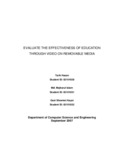| dc.contributor.advisor | Rahman, ASM Zillur | |
| dc.contributor.author | Hasan, Tarik | |
| dc.contributor.author | Islam, Majharul | |
| dc.contributor.author | Hayat, Gazi Showket | |
| dc.date.accessioned | 2010-10-10T03:33:19Z | |
| dc.date.available | 2010-10-10T03:33:19Z | |
| dc.date.copyright | 2007 | |
| dc.date.issued | 2007-09 | |
| dc.identifier.other | ID 02101028 | |
| dc.identifier.other | ID 02101031 | |
| dc.identifier.other | ID 02101032 | |
| dc.identifier.uri | http://hdl.handle.net/10361/390 | |
| dc.description | This thesis report is submitted in partial fulfillment of the requirements for the degree of Bachelor of Science in Computer Science and Engineering, 2007. | |
| dc.description | Cataloged from PDF version of thesis report. | |
| dc.description | Includes bibliographical references (page 55). | |
| dc.description.abstract | Distance education is a field of education that focuses on the technology and
instructional systems design that are effectively incorporated in delivering
education to students who (most of the time) are not physically "on site" to
receive their education.
In the twentieth century radio and television have all been used to further
strengthen distance education. Computers and the Internet make distance
learning easier. Bangladesh with population of about 130 million, less then 20%
of the total population has access to electricity. In rural Bangladesh the figure is
about 10%. Within the households with electricity at least 60% have TV and
majority of TV owners have VCD or DVD players because the availability of
cheap Chinese DVDs & VCD players. Cost of PC and Internet is very high over
video component.
The technology plays a key role in the delivery of distance education. Education
must remain focused on instructional outcomes, not the technology of delivery.
The key to effective distance education is focusing on the needs of the learners,
the requirements of the content and the constraints faced by the teacher, before
selecting a delivery system. The asynchronous nature in terms of communication
way like DVD that allow local teachers to take full control, to play and pause the
content at will, at times and paces of their own choosing, to engage in meaningful
dialogs with their local students, to train themselves after school hours, turns out
to be a blessing.
Education video learning can provide real time face-to face interaction. This is
also an excellent and cost-effective way to incorporate guest speakers and
content experts. Objective of our thesis will be to "Evaluate the effectiveness of
Education through video on removable media." | en_US |
| dc.format.extent | 55 pages | |
| dc.language.iso | en | |
| dc.publisher | BRAC University | en_US |
| dc.rights | BRAC University thesis are protected by copyright. They may be viewed from this source for any purpose, but reproduction or distribution in any format is prohibited without written permission. | |
| dc.subject | Computer science and engineering | |
| dc.title | Evaluate the effectiveness of education through video on removable media | en_US |
| dc.type | Thesis | en_US |
| dc.contributor.department | Department of Computer Science and Engineering, BRAC University | |
| dc.description.degree | B. Computer Science and Engineering | |

